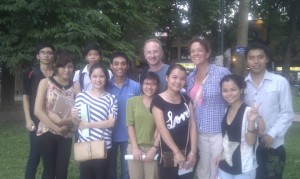Friday, September 14, 2012
U.S. Pop Culture and Cultural Exchange
Walking along the Hoan Kiem Lake in Hanoi at sunset yesterday, we were approached by a group of enthusiastic Vietnamese medical students who wanted to practice their English. Sharing their admiration of American movies and music, they inquired of us: “Why do you come to Vietnam? What do you like about our country?”
There’s something about communicating with those working to master basic English that gives one pause. While I instinctively speak more slowly and choose words I imagine they might easily understand, there’s a delicate art to doing so without sounding like I’m talking to a small child. Certainly their competency with the English language exceeds that of mine with Vietnamese. I must do my best to honor their courageous invitation to connect by offering a substantive exchange.
I tell them: “I am a history teacher. I bring students to Vietnam so they can learn about the “American War,” and how our countries are now friends. The history between the U.S and Vietnam has a lot to teach young people about the need for cross-cultural understanding and good economic relations for a more peaceful world. I hope my students will learn these lessons, and apply them to their studies of other conflicts in the modern day.”
The students nod, some comprehending less than others. How will they hit that conversational ball back over the net?
Dane, the boldest of my ambitious new friends, responds with a fascinating question:
“We know about America from the movies. What movies do you watch to learn about Vietnam?”
This question requires a more nuanced response, as relaying the long list of Hollywood attempts to “win” the Vietnam War on screen actually says more about our national psyche than it does about our genuine understanding of anything Vietnamese.
I reply honestly: “We have so many films about the Vietnam War, but most Americans don’t learn about other countries from watching movies. We only learn about other countries if we are personally interested to study, read the news or travel.”
I suddenly feel embarrassed, and then add lamely, “I’m sorry.”
Either my apology made no sense to them, or it didn’t matter because they only smiled in response. An awkward silence followed before the most fashionable of the group grabbed the opportunity presented by the pop culture thread of our exchange.
“Ah. Um. Do you like the American movie Titanic?”
What a moment! spontaneously, I burst with a dramatic rendering of the soundtrack.
“Far across the distance
And spaces Between us
You have come to show you
go on…”
amazingly, the students are uninhibited and jump in to sing together with me:
“Near, far, wherever you are
I believe that the heart does go on
Once more you open the door
And you’re here in my heart and
My heart will go on and on”
The laughter this evokes in all of us is so refreshingly unifying, I am awash with joy.
It’s true: U.S pop culture permeates the globe, creating an Ameri-centric view that may unhelpfully contribute to a sense of our own entitlement, justifiable military adventures, and economic hegemony. But sometimes it is this very ubiquity of culture that provides the lingua Franca for cross global connection between interested citizens of the planet.
Abstract notions of global security may not be enough motivation for the next generation of world citizens to investigate the merits of friendship. Maybe it is pop stars who create the universal language of understanding?
For now, I’m grateful that my Vietnamese student friends and I both are fluent in Celine Dion.

